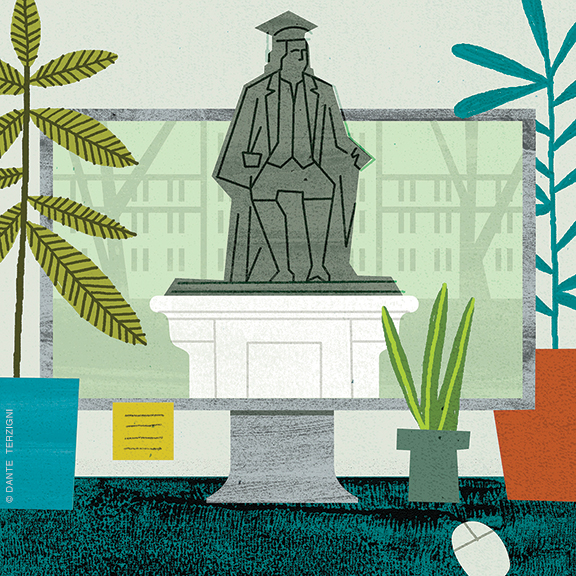
Penn will become the first Ivy to offer a primarily web-based bachelor’s degree.
Beginning next fall, Penn is set to become the first Ivy League school to offer a bachelor’s degree almost entirely online. The aim, University officials say, is to increase access and affordability for working adults and other nontraditional students and to link their academic studies more closely with their professional goals.
“We’re really excited about the vision of being able to reach more people with a Penn education,” said Nora Lewis, vice dean of professional and liberal education for the School of Arts and Sciences. “It’s kind of an educational frontier. We’ve already seen with online courses that we can build an incredibly vibrant, interactive community of people who never see each other face to face.”
The new bachelor of applied arts and sciences (BAAS) degree, awarded through the College of Liberal and Professional Studies, replaces the college’s current LPS bachelor’s degree. The program will combine general education courses with interdisciplinary concentrations and will require two brief visits to campus, the creation of an e-portfolio to show employers, and a capstone project.
The School of Engineering and Applied Science previously announced that it would offer a master of computer and information technology (MCIT) degree online that is geared to non-computer science majors. It is slated to launch in January.
Steven J. Fluharty C’79 G’79 Gr’81, dean of the School of Arts and Sciences, said the idea for the BAAS degree grew from the SAS strategic plan, Our Foundations and Frontiers, released in January 2015 . The plan suggested that the University was not fully addressing the needs of nontraditional students who “wanted a highly flexible undergraduate experience that enhanced their experience in their workplace,” he said. Students, faculty, administrators, and an advisory group of employers all were involved in the planning process.
Students will have a choice of four interdisciplinary concentrations: Creative Studies ; Literature, Culture, and Tradition ; Organizational Studies ; and Physical and Life Sciences . LPS will also offer certificates, requiring blocks of four to five courses, in such areas as applied positive psychology, climate change, and data analytics, as well as individual courses.
In the first year, each course unit will cost $2,250, compared to the current $3,312 for LPS students, and financial aid will continue to be available.
“It’s a different degree,” said Lewis. “We won’t have deep dives into one academic discipline. The career impact is a very intentional element.” A more extensive curriculum will be developed as the program grows in size. “We’re starting intentionally small to make sure we learn how to do everything at Penn quality,” she said.
Fluharty acknowledged that the idea of an online-only degree was not universally popular among Penn faculty. “Change is always disruptive,” he said. “There are critics on our faculty who don’t fully understand the vast advances that have been made in online pedagogy.”
Among those who do is Peter T. Struck, chair of the Department of Classical Studies and of the Arts and Sciences Online Faculty Committee [“Peter Struck’s Odyssey,” May|June 2017]. He said the new offerings draw on the University’s extensive experience with online courses. “There’s a lot of knowledge from the successes and failures of past iterations,” he said, noting that he taught his first online course in 2001 and that the technology has grown far more sophisticated.
Nevertheless, he said, the curriculum remains a work in progress—particularly in the sciences, “where labs are a critical component” and students may be required to spend more time on campus. Some faculty members remain skeptical that online learning can ever fully replace the live classroom experience.
“It really is a pilot and an innovation,” Lewis emphasized, “so assessment, tweaking, and improvement are really important.”
—Julia M. Klein




